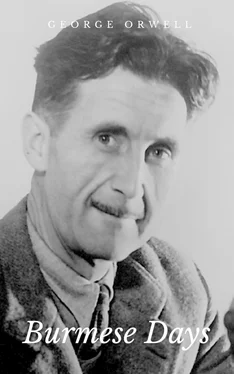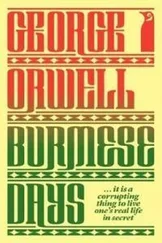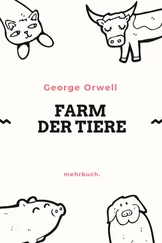‘What monstrous misrepresentations!’ cried the doctor. ‘Are not prissons necessary? And have you brought us nothing but prissons? Consider Burma in the days of Thibaw, with dirt and torture and ignorance, and then look around you. Look merely out of this veranda—look at that hospital, and over to the right at that school and that police station. Look at the whole uprush of modern progress!’
‘Of course I don’t deny,’ Flory said, ‘that we modernise this country in certain ways. We can’t help doing so. In fact, before we’ve finished we’ll have wrecked the whole Burmese national culture. But we’re not civilising them, we’re only rubbing our dirt onto them. Where’s it going to lead, this uprush of modern progress, as you call it? Just to our own dear old swinery of gramophones and billycock hats. Sometimes I think that in two hundred years all this—’ he waved a foot towards the horizon—‘all this will be gone—forests, villages, monasteries, pagodas all vanished. And instead, pink villas fifty yards apart; all over those hills, as far as you can see, villa after villa, with all the gramophones playing the same tune. And all the forests shaved flat—chewed into wood-pulp for the News of the World, or sawn up into gramophone cases. But the trees avenge themselves, as the old chap says in The Wild Duck. You’ve read Ibsen, of course?’
‘Ah, no, Mr Flory, alas! That mighty master-mind, your inspired Bernard Shaw hass called him. It iss a pleasure to come. But, my friend, what you do not see iss that your civilisation at its very worst iss for us an advance. Gramophones, billycock hats, the News of the World—all iss better than the horrible sloth of the Oriental. I see the British, even the least inspired of them, ass—— ass——’ the doctor searched for a phrase, and found one that probably came from Stevenson—‘ass torchbearers upon the path of progress.’
‘I don’t. I see them as a kind of up-to-date, hygienic, self-satisfied louse. Creeping round the world building prisons. They build a prison and call it progress,’ he added rather regretfully—for the doctor would not recognise the allusion.
‘My friend, possitively you are harping upon the subject of prissons! Consider that there are also other achievements of your countrymen. They construct roads, they irrigate deserts, they conquer famines, they build schools, they set up hospitals, they combat plague, cholera, leprosy, smallpox, venereal disease——’
‘Having brought it themselves,’ put in Flory.
‘No, sir!’ returned the doctor, eager to claim this distinction for his own countrymen. ‘No, sir, it wass the Indians who introduced venereal disease into this country. The Indians introduce diseases, and the English cure them. There iss the answer to all your pessimism and seditiousness.’
‘Well, doctor, we shall never agree. The fact is that you like all this modern progress business, whereas I’d rather see things a little bit septic. Burma in the days of Thibaw would have suited me better, I think. And, as I said before, if we are a civilising influence it’s only in order to grab on a larger scale. We should chuck it quickly enough if it didn’t pay.’
‘My friend, you do not think that. If truly you disapproved of the British Empire, you would not be talking of it privately here. You would be proclaiming it from the housetops. I know your character, Mr Flory, better than you know it yourself.’
‘Sorry, doctor; I don’t go in for proclaiming from the housetops. I haven’t the guts. I “counsel ignoble ease”, like old Belial in Paradise Lost. It’s safer. You’ve got to be a pukka sahib or die, in this country. In fifteen years I’ve never talked honestly to anyone except you. My talks here are a safety valve; a little Black Mass on the sly, if you understand me.’
At this moment there was a desolate wailing noise outside. Old Mattu, the Hindu durwan who looked after the European church, was standing in the sunlight below the veranda. He was an old fever-stricken creature, more like a grasshopper than a human being, and dressed in a few square inches of dingy rag. He lived near the church in a hut made of flattened kerosene tins, from which he would sometimes hurry forth at the appearance of a European, to salaam deeply and wail something about his talab, which was eighteen rupees a month. Looking piteously up at the veranda, he massaged the earth-coloured skin of his belly with one hand, and with the other made the motion of putting food into his mouth. The doctor felt in his pocket and dropped a four-anna piece over the veranda rail. He was notorious for his soft-heartedness, and all the beggars in Kyauktada made him their target.
‘Behold there the degeneracy of the East,’ said the doctor, pointing to Mattu, who was doubling himself up like a caterpillar and uttering grateful whines. ‘Look at the wretchedness of hiss limbs. The calves of hiss legs are not so thick ass an Englishman’s wrists. Look at hiss abjectness and servility. Look at hiss ignorance—such ignorance ass iss not known in Europe outside a home for mental defectives. Once I asked Mattu to tell me hiss age. “Sahib,” he said, “I believe that I am ten years old.” How can you pretend, Mr Flory, that you are not the natural superior of such creatures?’
‘Poor old Mattu, the uprush of modern progress seems to have missed him somehow,’ Flory said, throwing another four-anna piece over the rail. ‘Go on, Mattu, spend that on booze. Be as degenerate as you can. It all postpones Utopia.’
‘Aha, Mr Flory, sometimes I think that all you say iss but to—what iss the expression?—pull my leg. The English sense of humour. We Orientals have no humour, ass iss well known.’
‘Lucky devils. It’s been the ruin of us, our bloody sense of humour.’ He yawned with his hands behind his head. Mattu had shambled away after further grateful noises. ‘I suppose I ought to be going before this cursed sun gets too high. The heat’s going to be devilish this year, I feel it in my bones. Well, doctor, we’ve been arguing so much that I haven’t asked for your news. I only got in from the jungle yesterday. I ought to go back the day after tomorrow—don’t know whether I shall. Has anything been happening in Kyauktada? Any scandals?’
The doctor looked suddenly serious. He had taken off his spectacles, and his face, with dark liquid eyes recalled that of a black retriever dog. He looked away, and spoke in a slightly more hesitant tone than before.
‘The fact iss, my friend, there iss a most unpleasant business afoot. You will perhaps laugh—it sounds nothing—but I am in serious trouble. Or rather, I am in danger of trouble. It iss an underground business. You Europeans will never hear of it directly. In this place’—he waved a hand towards the bazaar—‘there iss perpetual conspiracies and plottings of which you do not hear. But to us they mean much.’
‘What’s been happening, then?’
‘It iss this. An intrigue iss brewing against me. A most serious intrigue which iss intended to blacken my character and ruin my official career. Ass an Englishman you will not understand these things. I have incurred the enmity of a man you probably do not know, U Po Kyin, the Sub-divisional Magistrate. He iss a most dangerous man. The damage that he can do to me iss incalculable.’
‘U Po Kyin? Which one is that?’
‘The great fat man with many teeth. Hiss house iss down the road there, a hundred yards away.’
‘Oh, that fat scoundrel? I know him well.’
‘No, no, my friend, no, no!’ exclaimed the doctor quite eagerly; ‘it cannot be that you know him. Only an Oriental could know him. You, an English gentleman, cannot sink your mind to the depth of such ass U Po Kyin. He iss more than a scoundrel, he iss—what shall I say? Words fail me. He recalls to me a crocodile in human shape. He hass the cunning of the crocodile, its cruelty, its bestiality. If you knew the record of that man! The outrages he hass committed! The extortions, the briberies! The girls he hass ruined, raping them before the very eyes of their mothers! Ah, an English gentleman cannot imagine such a character. And this iss the man who hass taken hiss oath to ruin me.’
Читать дальше











